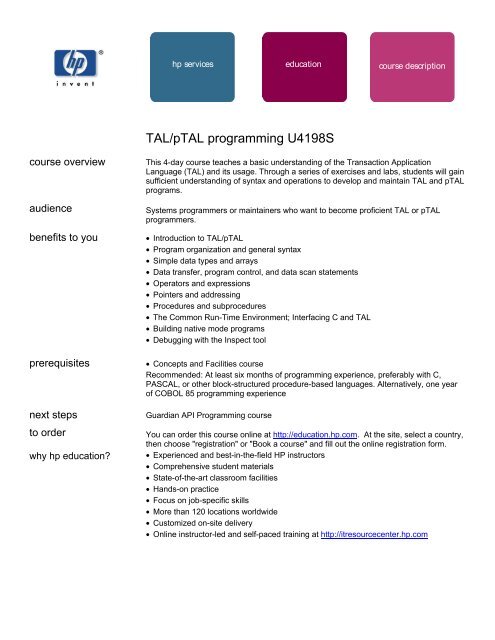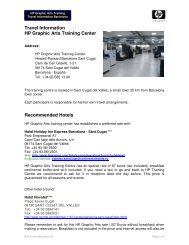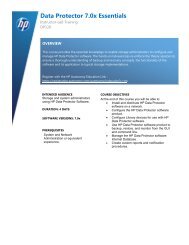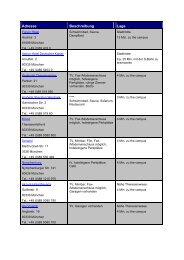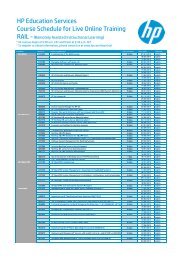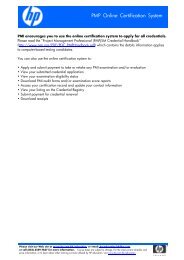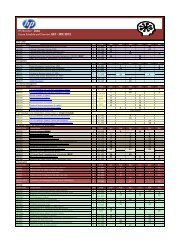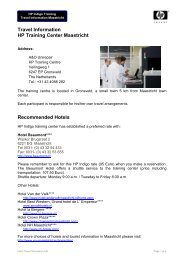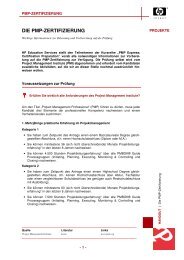TAL/pTAL programming U4198S - HP
TAL/pTAL programming U4198S - HP
TAL/pTAL programming U4198S - HP
You also want an ePaper? Increase the reach of your titles
YUMPU automatically turns print PDFs into web optimized ePapers that Google loves.
course overview<br />
audience<br />
benefits to you<br />
prerequisites<br />
next steps<br />
<strong>TAL</strong>/p<strong>TAL</strong> <strong>programming</strong> <strong>U4198S</strong><br />
This 4-day course teaches a basic understanding of the Transaction Application<br />
Language (<strong>TAL</strong>) and its usage. Through a series of exercises and labs, students will gain<br />
sufficient understanding of syntax and operations to develop and maintain <strong>TAL</strong> and p<strong>TAL</strong><br />
programs.<br />
Systems programmers or maintainers who want to become proficient <strong>TAL</strong> or p<strong>TAL</strong><br />
programmers.<br />
• Introduction to <strong>TAL</strong>/p<strong>TAL</strong><br />
• Program organization and general syntax<br />
• Simple data types and arrays<br />
• Data transfer, program control, and data scan statements<br />
• Operators and expressions<br />
• Pointers and addressing<br />
• Procedures and subprocedures<br />
• The Common Run-Time Environment; Interfacing C and <strong>TAL</strong><br />
• Building native mode programs<br />
• Debugging with the Inspect tool<br />
• Concepts and Facilities course<br />
Recommended: At least six months of <strong>programming</strong> experience, preferably with C,<br />
PASCAL, or other block-structured procedure-based languages. Alternatively, one year<br />
of COBOL 85 <strong>programming</strong> experience<br />
Guardian API Programming course<br />
to order You can order this course online at http://education.hp.com. At the site, select a country,<br />
why hp education?<br />
hp services education course description<br />
then choose "registration" or "Book a course" and fill out the online registration form.<br />
• Experienced and best-in-the-field <strong>HP</strong> instructors<br />
• Comprehensive student materials<br />
• State-of-the-art classroom facilities<br />
• Hands-on practice<br />
• Focus on job-specific skills<br />
• More than 120 locations worldwide<br />
• Customized on-site delivery<br />
• Online instructor-led and self-paced training at http://itresourcecenter.hp.com
<strong>TAL</strong>/p<strong>TAL</strong> <strong>programming</strong> (<strong>U4198S</strong>)<br />
module key topics<br />
introduction to <strong>TAL</strong>/p<strong>TAL</strong><br />
program organization and<br />
general syntax<br />
simple data types and arrays<br />
program flow statements<br />
terminal I/O<br />
operators and expressions<br />
pointers and addressing<br />
procedures and<br />
subprocedures<br />
interfacing C and <strong>TAL</strong><br />
for more<br />
information<br />
Technical information in this document is subject to change<br />
without notice.<br />
Microsoft®, Windows®, MS Windows®, and Windows NT® are<br />
U.S. registered trademarks of Microsoft Corporation. UNIX® is a<br />
registered trademark of the Open Group.<br />
©Copyright Hewlett-Packard Company 2000. All Rights Reserved.<br />
Reproduction, adaptation, or translation without prior written<br />
permission is prohibited except as allowed under the copyright<br />
laws.<br />
9/02 <strong>U4198S</strong><br />
• Transaction Application Language (<strong>TAL</strong> and p<strong>TAL</strong>)<br />
• <strong>TAL</strong>/p<strong>TAL</strong> <strong>programming</strong> in the Guardian environment of the NonStop Kernel operating system<br />
• Tools to assist the developer in writing and debugging <strong>TAL</strong> and p<strong>TAL</strong> programs<br />
• Basic syntax and organization of <strong>TAL</strong> programs<br />
• Identifiers, begin-end blocks, constants, operators, variable declarations, and procedure declarations<br />
• Compiler (both <strong>TAL</strong> and p<strong>TAL</strong>) directives that control listings<br />
• Sourcing from another file<br />
• The environment set up for the Inspect product and compile for syntax only<br />
• Basic Inspect software commands<br />
• How data is stored and what facilities <strong>TAL</strong> provides to access data<br />
• Correct data types for various purposes, definitions, literals, labels, and data equivalencing<br />
• Types of program flow statements and their usage<br />
• Statements for CASE, IF, program control, bit extraction, and manipulation<br />
Lab Exercise:<br />
• Use constructs such as the CASE statement and WHILE loop<br />
• How to perform terminal I/O in programs<br />
• Error handling and data conversion<br />
Lab Exercise:<br />
• Perform terminal I/O to prompt for data and implement data conversion<br />
• Types of operators and expressions<br />
• Arithmetic expressions and conditional expressions<br />
• Special expressions such as: assignment, CASE, IF, and group comparison expressions<br />
• Direct and indirect data access, pointers, and structures<br />
• Additional p<strong>TAL</strong> pointer data types<br />
• Data transfer and scan statements to illustrate use of pointers and structures<br />
• p<strong>TAL</strong> caveats<br />
Lab Exercise:<br />
• Use pointers, addressing, and data movement<br />
• Procedures and subprocedures, with or without parameter passing<br />
• Procedure declaration, subprocedure declaration, and procedure calls and returns<br />
• The use of formal and actual parameters in procedure calls and returns<br />
• <strong>TAL</strong> and p<strong>TAL</strong> considerations for Guardian procedures that are obsolete for p<strong>TAL</strong> procedures<br />
Lab Exercise:<br />
• Code procedures, with and without parameters<br />
• Invoke procedures, with and without parameters<br />
• Common Run-Time Environment (CRE)<br />
• How to interface C and <strong>TAL</strong> and memory model considerations<br />
• Use of development tools such as Bind, nld, and noft<br />
Lab Exercise:<br />
• Build runnable units from separately compiled C and/or <strong>TAL</strong> objects<br />
For more information on <strong>HP</strong> Education Services, contact any of our worldwide offices or<br />
visit our worldwide web site on the internet at http://education.hp.com


